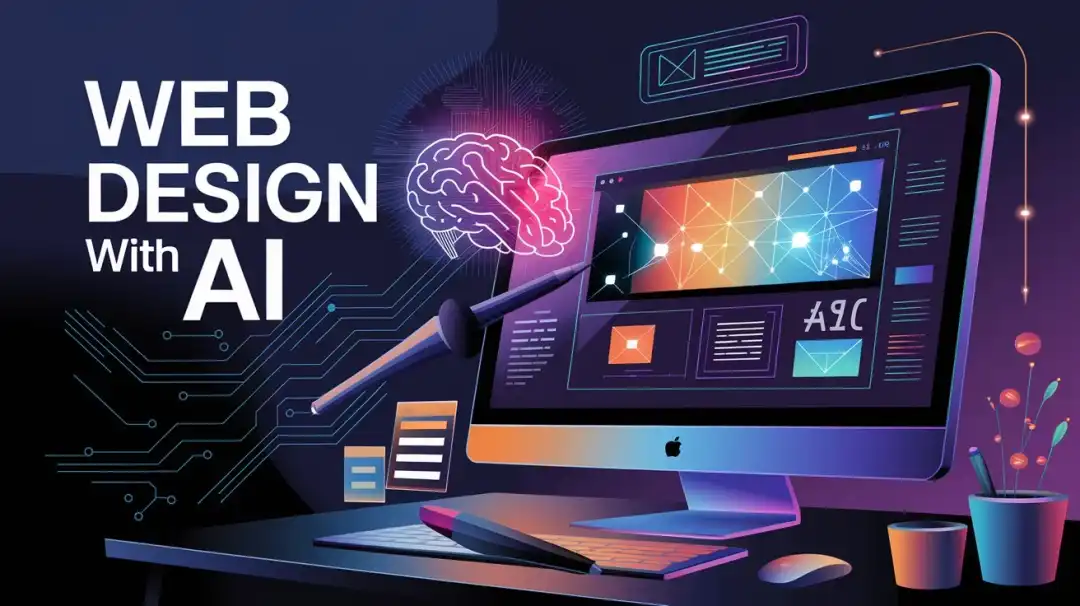
Web design has long been a field that required creativity, technical skills and hours of manual work. With the introduction of artificial intelligence, industry is undergoing a fundamental shift. What once had to be programmed, styled and adjusted by hand is now handled automatically, efficiently and based on data. For businesses, this opens up entirely new opportunities. If you are planning to build or relaunch a website, it is essential to understand what AI can offer in modern web design.
Artificial intelligence in web design does not mean that you become obsolete as a designer. On the contrary, it allows you to focus on what really matters. Instead of dealing with endless lines of code or fine-tuning CSS settings, you can direct your attention to design, user experience and content strategy. AI takes care of the rest. It identifies patterns, suggests layouts, optimizes images, organizes content and adapts your site automatically for different devices.
Smarter website structures for better outcomes
Modern AI-powered frameworks offer not just a visual template, but a technically sound foundation. This includes logical content architecture, optimized navigation paths, modular components and consistent design principles. Working within such a structure simplifies the management of your site while keeping it clear and scalable as your content grows.
This is especially beneficial for large projects with multiple languages or frequently changing information. Content can be reused, layouts adjusted flexibly, and new pages added without extra complexity. The time saved can be invested in improving your customer communication or expanding your service portfolio.
Technical optimization with performance built in
An AI-enhanced website is not only visually appealing. It also meets high technical standards. This includes fast loading times, minimal risk of errors and strong stability. Tools such as the Webflow AI Framework help achieve and maintain these performance goals. Through automated checks and clean semantic markup, your site is optimized both for visitors and search engines.
Semantic structure ensures that your content is properly indexed and understood. This improves visibility in search results and ensures that platforms like Google or Bing display your content cleanly and professionally. In the competitive online landscape, this is a major advantage.
Tailored experiences through intelligent customization
A major benefit of artificial intelligence in web design is its ability to personalize. Intelligent systems can recognize the device your visitor is using, the preferred language or even user behavior. This allows you to deliver content that feels more relevant and engaging to each visitor.
When it comes to accessibility, AI also offers clear advantages. Automated tools can evaluate color contrasts, text sizes and page structure, offering suggestions for improvement. These can often be implemented without any advanced technical knowledge. The result is a website that is more inclusive and compliant with legal accessibility standards.
Time savings and cost efficiency through automation
Using AI in web design reduces the workload of both developing and maintaining a site. Many processes run in the background automatically, reducing human error and cutting down development time. Whether it is layout generation, text structuring, image compression or mobile responsiveness, most modern systems handle these tasks efficiently without requiring constant manual input. This same AI automation principle applies to other business processes, like transforming existing PowerPoint presentations into engaging interactive eLearning courses that can be deployed quickly across your organization.
This not only lowers operating costs but also enhances planning and responsiveness. Changes can be implemented faster, new pages go live more quickly and existing content is easier to update. If you need to react to trends or introduce a new product, these capabilities provide a significant competitive edge.
Consistence in team workflows
AI-driven frameworks are especially valuable for businesses working in larger teams or with external agencies. Clearly defined naming conventions, modular systems and unified layout principles ensure a smooth handoff between team members. Even when several people contribute to the website, the structure remains intact and consistent.
This minimizes misunderstandings, reduces unnecessary revisions and avoids inconsistent visuals. Rather than spending time fixing formatting issues, your team can focus on developing the site further. The end result is a digital presence that looks professional and is easy to maintain in the long run.
Strategic value of AI tools for modern businesses
Artificial intelligence is not a replacement for human creativity. Instead, it acts as an intelligent tool that supports your goals. In web design, it creates room for innovation without taking control of creative direction. Humans still set the strategy, but AI helps implement it more effectively. This proves particularly useful when dealing with complex demands or tight timelines.
If your website is more than just a digital business card, if it is meant to serve as a sales tool or communication platform, AI tools can play a key role. Artificial intelligence can increase your online visibility, improve the structure of your content and deliver more targeted user experiences. The result is a high-performing, modern website that delivers measurable value to your business.
It is also worth remembering that your visitors are still human. They need a seamless, fast and engaging experience. With the help of AI-based optimization, you can deliver exactly that.